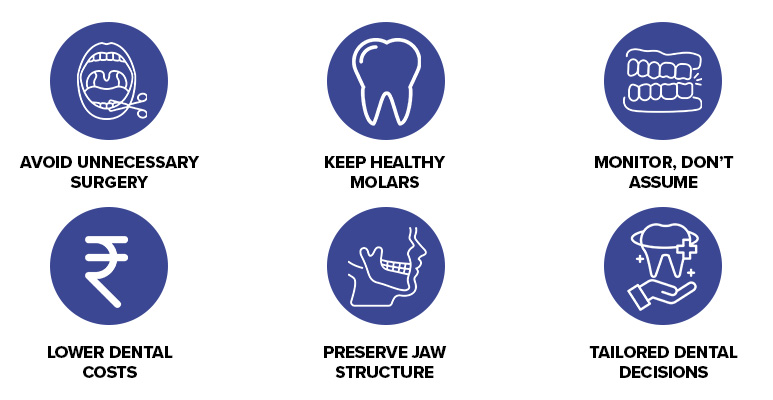Why Experts Now Say Not To Remove Your Wisdom Teeth

Once considered a standard procedure in dental care, the automatic extraction of wisdom teeth is now facing increasing scrutiny from dental professionals and oral health experts. For decades, it was almost a rite of passage—removing third molars even before they caused any issues, all in the name of prevention. However, the tide is turning. Backed by evolving research and real-world case studies, modern dentistry is now questioning the necessity of this long-standing practice.
Instead of defaulting to surgery, many professionals advocate for a more conservative, evidence-based approach that emphasizes preserving these molars when they are healthy, functional, and properly aligned. This shift in perspective has sparked a broader, more thoughtful conversation about the benefits of keeping wisdom teeth—including their role in maintaining bite balance, supporting jawbone integrity, and avoiding the risks and costs associated with unnecessary surgical procedures.
Let’s unpack why experts now say not to remove your wisdom teeth—and what it means for your oral health.
What Are Wisdom Teeth, and Why the Fuss?
Wisdom teeth, also called third molars, usually appear in your late teens or early twenties. For many, they come in crooked, partially, or not at all—leading to impaction and discomfort. For years, this meant one thing: extraction.
But is removal always necessary?
Modern dental practices are leaning towards case-by-case assessments instead of blanket extractions. This approach not only reduces unnecessary surgery but also highlights the benefits of keeping wisdom teeth when they’re problem-free.
Why Experts Now Recommend Keeping Them (When Safe)?
1. Healthy Wisdom Teeth Function Just Like Other Molars:
If your wisdom teeth come in straight, are easy to clean, and don’t crowd nearby teeth, they can assist with chewing and help distribute bite force more evenly.
2. Avoiding Surgical Risks:
Tooth extractions are surgical procedures—and like any surgery, they carry risks:
- Infection
- Nerve damage
- Swelling and jaw stiffness
- Dry socket
By keeping healthy wisdom teeth, you eliminate these unnecessary complications.
3. Natural Tooth Preservation Is Preferred:
Dentistry today focuses on preserving your natural teeth as long as they are not causing harm. Healthy third molars contribute to the structural integrity of your dental arch.
4. Less Financial Burden:
The wisdom teeth removal cost in Chennai can range anywhere from INR 3,000 to INR 10,000 per tooth, depending on complexity. Avoiding an unneeded extraction saves you money, time, and recovery hassle.

When Is Wisdom Tooth Removal Still the Right Choice?
Despite this shift in thinking, extraction remains necessary in certain cases:
- Impacted Teeth: Trapped in the gum or jawbone and causing pain
- Infection or Gum Disease: Recurrent issues surrounding the tooth
- Cavities or Decay: Hard-to-clean areas leading to dental damage
- Cysts or Tumors: Rare but serious complications
- Crowding: Pushing other teeth out of alignment
The key is evaluation—not assumption.
The Role of Monitoring and Regular Check-ups
Instead of removing wisdom teeth as a preventive measure, dentists now recommend:
- Routine X-rays
- Annual dental assessments
- Monitoring for subtle shifts or signs of infection
Your local dental clinic in Chennai can provide guidance tailored to your unique oral anatomy and long-term health needs.
What Are the True Benefits of Keeping Wisdom Teeth?
Better Chewing Efficiency:
Four extra molars mean more surface area to break down food, easing digestion.
Support for Jaw and Facial Structure:
Your wisdom teeth may help maintain bone density in the jaw and prevent structural shifting.
Reduced Dental Intervention:
Fewer surgeries mean fewer complications, less time off, and minimal interference with your oral ecosystem.
Natural Back-up for Tooth Loss
In rare cases, a healthy wisdom tooth can even replace a lost molar if repositioned properly.
Best Practices If You’re Keeping Your Wisdom Teeth:
If you and your dentist agree that keeping your wisdom teeth is the best option, here’s how to maintain them:
- Brush carefully around the back molars
- Use floss or water flossers to reach tight spaces
- Rinse with antiseptic mouthwash
- Schedule regular dental cleanings and exams
These steps will help ensure your wisdom teeth stay healthy and functional.
Why Is Old Wisdom Being Challenged?
Dental practices evolve. Why do experts now say not to remove your wisdom teeth? Because what was once considered best for all is now replaced by a personalized, diagnostic approach. This patient-first perspective values preservation, comfort, and practicality—redefining what “normal” treatment looks like.
More professionals are now emphasizing:
- Individualized care over general recommendations
- Long-term outcomes over short-term fixes
- Comprehensive evaluations before opting for surgical procedures
This shift doesn’t just improve dental outcomes—it builds trust and empowers patients.
When to Talk to a Dentist?
If you still have your wisdom teeth, and they’re not causing problems, it’s worth getting an expert opinion. Monitoring is often enough.
However, if you’re experiencing:
- Persistent pain or swelling
- Jaw stiffness or crowding
- Difficulty chewing near the back of your mouth
Then it’s time for a professional evaluation.
Clinics like Radiant Dental Care use modern imaging, diagnostics, and years of expertise to assess the best path forward.
Rethink the Routine!
Routine wisdom teeth removal is no longer the default dental recommendation it once was. Today, dentists are shifting toward a more personalized approach—one that considers your unique oral health, the position of your teeth, and whether they’re truly causing harm.
The benefits of keeping wisdom teeth can include added chewing support, preserved jawbone structure, and avoiding the risks associated with unnecessary surgery. Rather than following tradition or fear, this decision should be based on informed conversations with your dental expert.
With proper guidance and regular monitoring, you may not need to part with your third molars after all. And when it comes to making the right call for your oral health, Radiant Dental Care is here to help you evaluate what’s best for your smile—because sometimes, holding on to your wisdom is the smartest choice.
Frequently Asked Questions:
Is it necessary to remove wisdom teeth if they don’t hurt?
Ans. Not always. If your wisdom teeth are fully erupted, healthy, properly aligned, and not causing any crowding or damage to nearby teeth, they may not need to be removed. Many dental experts now recommend monitoring rather than immediate extraction, especially when there are no signs of pain or infection.
What are the risks of removing wisdom teeth?
Ans. Like any surgical procedure, wisdom tooth removal carries certain risks. These can include infection, bleeding, nerve damage, swelling, dry socket, and jaw stiffness. While complications are generally rare, the procedure can be more complex if the teeth are impacted or located near major nerves.
Can wisdom teeth be beneficial?
Ans. Yes, when healthy and aligned, wisdom teeth can serve useful purposes. They can assist in effective chewing, help maintain spacing in the dental arch, support jawbone density, and even act as reserve molars in case other teeth are lost or extracted due to decay or trauma.
How do I know if my wisdom teeth are impacted?
Ans. Impacted wisdom teeth may not always cause immediate symptoms, but signs can include jaw pain, swollen or tender gums, difficulty opening the mouth, unpleasant taste, or bad breath. A clinical evaluation and dental X-ray from your dentist will help confirm whether your wisdom teeth are impacted or at risk of complications.
Is it cheaper to keep or remove wisdom teeth?
Ans. In many cases, retaining healthy wisdom teeth can be more economical in the long run. Avoiding unnecessary surgery eliminates both the wisdom teeth removal cost in Chennai and the additional expenses tied to post-operative care, medications, and potential complications—provided that the teeth remain trouble-free.

 +91 9513446186
+91 9513446186
